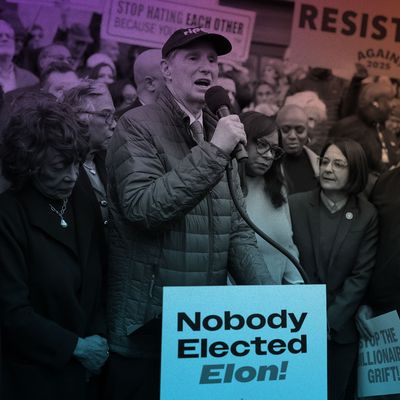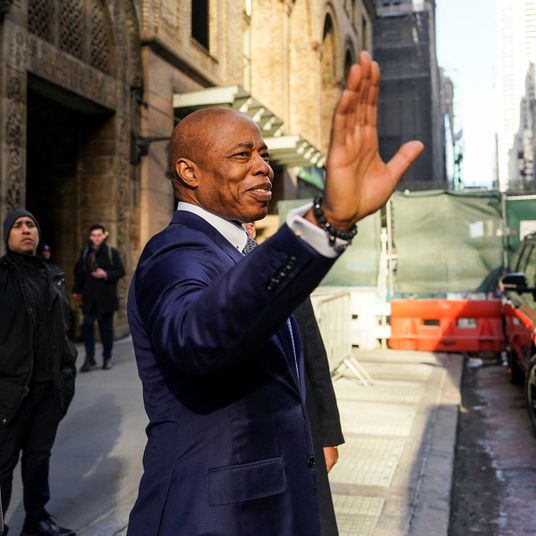
Democratic senator Ron Wyden of Oregon has been a highly visible opponent of the Trump agenda. He was a central antagonist to Tulsi Gabbard and RFK Jr. at their confirmation hearings. He has repeatedly highlighted the chaotic fallout from the president’s attempted federal spending freeze. A longtime advocate for privacy rights, Wyden has also spoken out strongly against Elon Musk’s intrusion into the machinery of the federal government and the Treasury Department’s role in it. I talked to Wyden, who has served in the upper chamber since 1996, about why he freely uses the word “coup” to describe recent events, where Democrats can use their leverage over the next few months, and why chutzpah is an essential quality for politicians.
I talked to your colleague, Senator Brian Schatz, last week, and asked him about what would happen if President Trump simply defied a court order. He didn’t want to get into that possibility. But this is even more relevant now, with Vice-President Vance suggesting that the executive branch shouldn’t be bound by court decisions. Is there any kind of plan in place among Democrats for that possibility?
Number one, the judges are going to have to be much more aggressive about enforcing their orders. I don’t think Musk will quietly go off and stop breaking the law. Let me give you a little bit different take than maybe you’re getting, because I’m co-chair of the Whistleblower Protection Caucus in the Senate. And one of the things Trump really dislikes is bad press, and holding him accountable for his lies and the various scams he’s pulling is one of the best ways to get some leverage.
Let me give you a quick example. At the end of January and bleeding into February 1, the whistleblowers that we work with gave us all the information we needed to know that Scott Bessent was the one who gave the okay to go in on the Treasury payments. And that came at the end of a week where we had blown the whistle — the same way, with whistleblowers — about Medicaid portals. And I put up something saying that 50 states have already seen some holds on their Medicaid efforts. Trump was really unhappy with that press. Three hours later, his comms person came out and said, “We’re going to get it fixed.” And by the next day, it was fixed. So you’ve got to use all the tools that are out there: the courts, Congress, dates like March 14, when the Republicans will want to show that they didn’t shut down the government. There’s no question that there’s a lot of debate about how to run this effort to hold Musk particularly accountable, but we’re making progress. He’s the richest guy in the world. He’s calling Social Security a scam. I’m a privacy hawk, and people are coming up to me — they think this is like George Orwell all over again.
Are you saying that the threat of bad press would deter Trump or Musk from defying a court order?
I think it’s one of the tools. But if the courts send people to jail, that’s going to wake people up as well.
I think people are asking, who is going to send them to jail, exactly? Will there be cops or troops enforcing this, or what? Obviously this kind of thing hasn’t played out yet. But you have to consider the possibility that something really serious could happen.
You have tools for accountability, and we’ve got to aim high on this and show people we’re up to the fight. And when you’re up to the fight, everybody says, “Tell us what we need to do,” and we’ll tell them.
You have a very long history of working on internet-privacy matters. Obviously, Elon and his associates gaining access to the Treasury Department, including Americans’ financial information, is alarming. Whenever there’s a big cyberattack on a company or government institution from a foreign power, though, I’m always confused as to how alarmed I should be, because it’s hard to tell if there will be actual repercussions. I wonder how concerned you think people should be in this distance, with their data potentially out there.
I think people should be damn concerned. A lot of this is older systems, and they’re rewriting code and messing around in there, and people could really get hurt. These staffers have access to some of the most sensitive information about Americans imaginable: their health care, their retirement, their taxes. When you have old systems and people meddling around in them, it’s a real threat.
Your Republican colleagues aren’t really speaking out against all this; they’re clearly afraid of retribution. But do you get the sense that they like Elon Musk or that they approve of what’s going on here?
I think they are getting afraid of some of the consequences. We heard Republicans over the weekend talking about how their universities were going to get hurt in health-care research, and Republican senators in agriculture-heavy states were panicking over tariff threats, because that raises questions about the security of American-grown food and inflation. So I think Republican senators have been trying to assess what they can do to mitigate the damage Trump and Musk are doing in their states, but they’re certainly more concerned now than they were. And I think they’re also hearing people say, “What are you doing about all this stuff?” And their answers haven’t gone a long way with their constituents.
Going back to what you said about March 14 and the deadline for a government shutdown — do you feel like the caucus is pretty united about the leverage they’re willing to use to get funding back, maybe get USAID restored, and so on?
I think the Congress understands you have to use every bit of leverage. At some point, Republicans in Congress are going to say, “Our people are getting hurt and we can’t just look the other way,” as Musk is taking away their constitutional authority. Democrats are going to have tough challenges throughout the funding debate, but I think we’re going to stay at it so that we make it clear we’re not just going to look at an executive branch that brazenly violates the law.
You have a long history of working with whistleblowers. There’s a lot of angry and disgruntled federal workers right now. Have you found them very eager to talk to you — that there’s a real font of whistleblowers?
It’s a trove of information. It’s very, very helpful.
I also saw that Senator Schumer announced the opening of an official portal for whistleblowers.
Senator Schumer and I have worked on whistleblower issues for some time, but I’m going to expand the effort to include state and local governmental bodies as well, because I think very often they have information that also involves federal funds.
Another thing you’ve worked on a lot over the years is civil liberties. What worries you most on that front of the next four years?
What I can tell you is that civil-liberties issues are already popping up, and I think it’s going to get worse. Prosecutors are taking orders from Musk and threatening to charge people who name his henchmen. The reality is that he is attacking constitutional freedoms, and they won’t stop unless Republicans in the Congress records make them. And what I’m telling people — I have town-hall meetings coming up at home that are going to be having a lot of people turn out — is Americans need to let Musk know that this stuff that’s taken away their privacy and their liberties won’t fly. Trump and his crew claimed to be for free speech, but now they’re turning back the clock and taking away your right to free speech. And over the weekend, they were busy talking about plastics and pennies.
I have to say I agree on the pennies thing — it’s one of the only things Trump has done that I think is a good idea. But, yes, I take your point.
Musk’s people claim to be for the Constitution, but now they’re promising to investigate reports for telling the public what the government is up to. Think about that one.
We’ve also got somebody at the FCC, Brendan Carr, who is investigating CBS News for no reason and opening investigations into other major networks that he sees as skewing liberal. So it’s not just Musk — it’s the whole federal apparatus here.
Well, there’s no question that he has spawned some allies, but he’s taken the lead. And what I’m going to be saying this weekend is, isn’t there a big departure from taking away your rights to speak out and enjoy your freedom and what you said you were going to do in terms of making eggs and milk cheaper? Those are the kinds of things that I think are going to resonate with people in some of these instances. Trump called off the fight against inflation right after he was sworn in.
We heard a lot during the Harris campaign that a lot of Americans aren’t that receptive to warnings about democracy writ large, that they’re more concerned about day-to-day living and prices. It sounds like you’re saying there’s a two-pronged approach here, which is telling people they’re losing their rights while Trump drops the ball on inflation and cost of living.
Yeah. And literally ten days after I blew the whistle on Bessent giving the keys away to Treasury payments, we had big crowds out all over. And I think this is the beginning.
The other point I’d make is that political change in America now rarely starts in Washington, D.C., and then trickles down. All the things that I’ve described to you, which I think are my big priorities, don’t trickle down from Washington but happen when you mobilize people at the grassroots level. And I think that will become increasingly clear, because that’s what Trump and Musk pay attention to. Attorneys general, state legislatures, citizens groups, rallies, town-hall meetings, cumulatively it sends a message that we think this is a big deal. That we’re just not sitting around when all the wheels of what amounts to a coup are being set in motion.
You’ve called it a coup and an authoritarian takeover. I’ve noticed you’ve been more straightforward in that kind of plain language than some of your colleagues. What’s happening is obviously extremely unnerving. But when I think of a coup, I think of people taking over the government from the rightfully elected leader.
I’m trying to make it clear that this is a big departure from the Founding Fathers. The Founding Fathers said, “Look, here’s what Congress does. Here’s what the president does.” This is what we have enjoyed for all of these years, and it has been something that has served us well. And now you have somebody in Elon Musk, who basically paid for an election, coming in and saying he runs everything. If you have unelected individuals breaking the law to take power, that about fits the definition of a coup. You’re right to ask for the definition, and that’s the one we’ve been using.
You recently came out with a book, It Takes Chutzpah, which is structured as something of a guidebook on how to fight for progressive values. Clearly it’s going to take a lot of chutzpah for Democrats —
I was just going to say, I said a minute ago to somebody that if ever there was a time for chutzpah, this is it.
It seems you have quite a bit of it. Do you think your Democratic colleagues have enough chutzpah to get through this moment?
I think we’re wrestling with that question, but I think more and more senators are saying — this is so brazen, this is so destructive to the rule of law and the constitutional principles we’re all about. And that’s something I know a lot about. If you look at the book I wrote, I said my mother was the one who warned everybody about the threats of authoritarians. I really feel that chutzpah is in my DNA and I consider my primary challenge to help people demonstrate that we’re up for the fight. I think you lose elections because people don’t believe that you’ll really go to the mat to change things for the better. So to me, you start by showing you can win people’s trust by demonstrating concrete strength and courage and courage every day.
This interview has been edited for length and clarity.





























